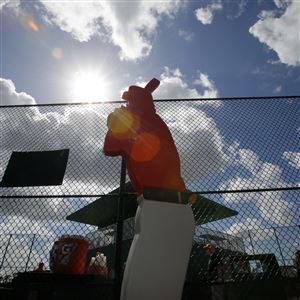The get-rich-quick fantasy is fading for the eBay drop-off store business. The recent years' explosion of grand openings by independent operators and franchisors ready to help consumers sell the stuff in their attic online appears to have slowed as experience proves how hard it can be to make a profit.
California-based franchisor iSold It recently announced it would stop selling new franchises so it could focus on helping existing franchisees. The move came as the company faced complaints from ex-franchisees who set up a Web site to air their concerns that iSold It painted a too rosy picture of the prospects.
Another franchisor, QuikDrop, grew quickly and then saw enough franchises close that it has turned far more selective about approving new stores. "We are getting a better understanding of what it takes to do business in this market," said Jack Reynolds, co-founder of the Nevada-based company.
Franchises aren't the only ones tinkering with the model for success in what was always a quirky proposal: trying to open up the eBay online garage sale to those more comfortable with bricks-and-mortar stores. More than one independent operator has stopped taking low-priced items and started charging higher commission rates to help the bottom line.
"Basically, it's a lot more work than people realize," said Kathleen Orellana, who owns the SeeItSell! store in McCandless, which she said was profitable. She enjoys the treasure hunt aspect that comes with never knowing what will walk into the store every day.
But that doesn't mean it's easy. Store operators of all types struggle to educate the public on what they can do -- and can't. Customers have their own fantasies of discovering that old baseball card or lamp is worth a small fortune. It can be painful to hear that bidders on eBay are likely to pay so little that it won't be enough to cover a store operator's time and expenses.
A survey by trade publication AuctionBytes last year found it took an average of more than 20 minutes to research, caption, photograph and list just one item on eBay.
That didn't include time spent packing, shipping and answering bidders e-mails about the items. Doing it all well, including knowing what price to start an auction, takes experience.
For those who set up storefronts, the money they make has to cover the rent and other overhead costs. If something sells for $20, there's not much left after eBay fees and the customer's take.
Gary and Shelley Wain decided the payoff wasn't worth sticking with the SellYourStuffAuctions.com eBay drop-off service they launched a few years ago to supplement their Pleasant Hills craft mall. "We're no longer doing that at all," said Mr. Wain, although he still sees potential for niche players.
Pilar Meyer stopped accepting goods at the Murrysville ezbay stores location she bought last year from the original operator, but not because she's getting out of the business. She has been tinkering with the format and plans to move the store closer to her home in Sewickley.
There's no lack of interest from customers hoping to convert their unwanted items into cash, she said. "In the beginning, I was just ecstatic that stuff was selling." She has since learned to turn away items that won't make it worth her while. She also has raised her commission rates and has been studying stores that make lots of money. "They're not millionaires doing what I'm doing."
Mark W. Davis thinks he has developed a better system but needs investment capital to prove it. His WeSellNow operation has one location in Robinson accepting goods from walk-in customers. Last year, with the help of investors, he opened an 18,000-square-foot processing center that can support eight stores.
Finding the right real estate has been a challenge. A store in McMurray had to be closed because it wasn't getting enough business. Another location is set to open soon at a busier site in Monroeville. More sites should bring the processing center closer to capacity and spread ad costs.
Meanwhile, WeSellNow has boosted efficiency by helping corporate clients sell pallets of unneeded merchandise such as plumbing equipment or tools. If a store has 20 similar items, it simplifies taking pictures, writing descriptions and handling bid questions.
Things also are more efficient when walk-in customers understand the service. Mr. Davis estimated it takes about 25 minutes to educate a first-time visitor. Once individuals have been through an auction, things speed up. He said 50 percent of WeSellNow's business comes from repeat customers.
An ongoing debate has been over whether a franchise or independent model makes more sense. Independents tend to think franchisors charge store operators too much in fees, while franchisors claim it's worth being part of a network of stores that can raise awareness and share business practices.
At QuikDrop, Mr. Reynolds said he believes his company has added value, both in creating the store model and in helping battle regulation attempts by government bodies.
At its peak, the franchisor had about 90 stores; it now lists about 50 locations on its Web site. A franchise store that opened on McKnight Road is now closed. "We went a long time without any failures at all," said Mr. Reynolds. One puzzle is that some locations do incredible amounts of business, he said, while others can't get to $10,000.
QuikDrop has begun limiting franchises mainly to operators who plan to run their own stores, he said, rather than those who use it as an investment on the side. In addition, the company is working to develop more innovative tools.
At the region's only iSold It store, manager John Kohnfelder can see benefits and drawbacks to both models. "It is still up in the air among many eBay trading posts -- both franchises and independents -- whether this is a viable business model. In my opinion, it takes a lot of hustle and many hours to succeed in a business like this."
The eBay drop-off stores don't just compete with each other, of course.
UPS stores offer an eBay auction service. Places such as Dargate Auction Gallery in East Liberty also will put certain items on the online auction site, and many trading assistants work from their homes.
Customers can even take a shot at doing it themselves -- or host an old-fashioned garage sale and hope for the right buyer to show up on a sunny Saturday morning.
![]()
![]()
 Auctioneers licenses an issue for eBay sellers
Auctioneers licenses an issue for eBay sellers
![]()
First Published: May 3, 2007, 12:30 a.m.














